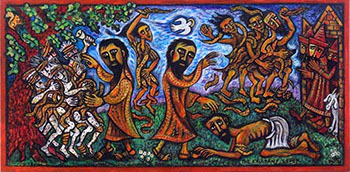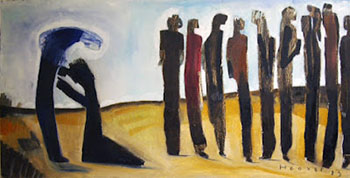From Our Archives
For earlier essays on this week's RCL texts, see Michael Fitzpatrick, This Saying is Sure (2022); Debie Thomas, A Foreigner's Praise (2019); Dan Clendenin, A Theology of Geography (2016) and A Crisis is a Terrible Thing to Waste (2013); Where God Works (2010).
This Week's Essay
By Amy Frykholm, who writes the lectionary essay every week for JWJ.
Psalm 66:12: “You let people ride over our heads; we went through fire and through water; yet you have brought us out to a spacious place.”
For Sunday October 12, 2025
Lectionary Readings (Revised Common Lectionary, Year C)
Psalm 66:1–11 or Psalm 111
2 Timothy 2:8–15
Luke 17:11–19
As of the day that I am writing this, there have been 326 mass shootings in the United States so far this year. For the Gun Violence Archive, which tracks mass shootings, a mass shooting is defined as one in which four or more people are killed or injured. On September 28 alone, there were three mass shootings in the US. And there had been three the day before. Sometimes these incidents make the news, and just as often they do not.
On the same day that I was scanning the newspaper in my usual way — taking note of these incidents, but not really capable of anything but a vague, terrible feeling — my eye caught another story. This was in The New York Times, and the headline read, How 106 People Got Together to Stop a School Shooting — Before It Happened. In rural New York, a bullied and alienated young man on a school bus threatened other students. This is now perhaps so common an event that it is easy not to take it seriously, and yet there have been so many shootings in schools (one in my own home state of Colorado just a few weeks ago), that any threat seems like a credible threat.
What happened next is quite remarkable and worthy of our attention. One hundred and six people from 59 organizations began looking into the young man’s situation. They found many things that could point to him being the next school shooter: intense bullying by classmates, a deep sense of alienation, a troubled family life, and easy access to guns. The first thing that Sergeant Krystyna Feola of the Madison County Sheriff’s Department did was go to the young man’s home and make sure that the guns in the home were secured. “That’s the only training I had,” she said.
 |
|
Brian Whelan, The Exultant Leper (2021).
|
But following new protocols established by the governor of New York, Kathy Hochul, Feola activated a network of people, resources, and agencies with the intention of addressing the root of the crisis. I was perhaps struck most by the work of Mike Carinci, the school resource officer, who began by viewing hundreds of hours of video from the school bus so that he could deeply understand the nature of the young man’s distress. “Just horrible things, like nonstop,” he said. Carinci became the young man’s ally and a trusted person to whom he could turn. Carinci also worked with the students who were involved in the bullying, trying to reset school culture.
As I observed the choices that the adults made, I was struck by how nuanced they made the ideas of “victim” and “perpetrator,” how carefully they attended to the context in which these events were taking place, and how clear they were about their life-saving mission. The young man was, yes, a potential perpetrator, but they had the opportunity to intervene before he picked up a gun to harm others. He was also a victim of many things beyond his control. And while the students on the bus were potential victims of an easy-to-imagine scenario, they were also human beings with the opportunity to change and to grow.
 |
|
Michelle Winter, The Ten Lepers.
|
I remembered the day when I, as a school board member, was briefed on a credible threat involving a student in our own district. I remember how helpless I felt, how vulnerable our schools and our kids were. I remember the pain I felt for the young man who was the source of the threat. He lived next door to the president of the school board, and she witnessed him sitting outside, alone, for hours at a time, smoking marijuana. Like the community members interviewed in the Times story, I knew that suspending him from school didn’t make our community any safer.
In the case of the young man in New York, with the help of all these people whose work was focused on the repair of a broken situation, he graduated from high school. During his senior year, he asked to meet with the team so that he could say thank you. He’s not out of the woods exactly. Chaos, violence, and brokenness attend his daily life. But he was surrounded by care, and that has made a difference.
In the story of the ten lepers in this week’s lectionary (Luke 17:11–19), we aren’t necessarily inclined to pause and feel the pain of the lepers before their healing. Many of us have heard this story a thousand times, and we’ve been taught to focus on the importance of saying thank you. But if you pause, like Mike Carinci did, to focus on what exile feels like, what it is like to be hated and excluded by the community in which you live, the story comes more potently alive. In every school in America, kids could probably point out who the lepers are — those children who for a variety of reasons feel deep alienation and exile. By no means will every one of these people turn to violence, but that’s not why we should care.
 |
|
Bill Hoover, Ten Lepers (2013). |
Ben Voce-Gardner, director of counterterrorism at the State of New York’s Division of Homeland Security and Emergency Services, who worked on the team at the state level, points out that you can never know if you prevented an incident of mass violence. “That’s the point of the whole program,” he said. “We’re trying to get there early, so it will be difficult for us to ever get to a point where we can tell you definitively, ‘We stopped a mass attack.’”
Alienation itself is a kind of violence, and it’s everywhere. What Carinci did was like what Jesus did: he sought healing first through empathy. He witnessed the pain. Then together with many others, Carinci began to find the means for healing.
Right now, in communities everywhere, there are opportunities to do what these 106 people did. We know, all of us, where the pain is, where the alienation is, where the exiles are. Alienation and exclusion have many different names and causes. When Jeremiah writes to the exiles in Babylon, he says, “Seek the shalom of the city where I have sent you into exile … for in its shalom you will find your shalom” (Jeremiah 29:7). The word shalom has a number of important resonances. Not only peace and welfare, but also harmony, fulfillment, and flourishing. If we are to seek shalom in our communities, right now, in these conditions, it seems to me that we can follow this very same advice: seek the shalom of the exiles. Their shalom will be our shalom.
Weekly Prayer
James A. Pearson
To not be able to move
my body toward the scared,
the lonely, the grieving—
this is a new practice
in holding my heart open
longer than I know how.James A. Pearson is poet, essayist, coach, and facilitator who lives in the Pacific Northwest of the United States. This poem is from his book, The Wilderness That Bears Your Name (Goat Trail Press, 2024), p.22.
Amy Frykholm: amy@journeywithjesus.net
\Image credits: (1) Art and Theology; (2) God Running; and (3) Blog of the Dormition.





